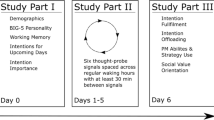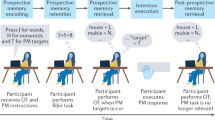Abstract
There has been little research on variables that affect importance ratings for real prospective memory tasks (e.g., remembering to take medications). Our primary purpose was to test a claim in the motivational-cognitive model of prospective memory, namely that prospective memory tasks highly related to a person’s goals and concerns will be rated as more important. We also tested whether this relationship held in both young and older adults. A secondary purpose was to investigate age-related differences in the perceived importance of prospective memory tasks. Older adults and two younger adult groups completed a questionnaire that assessed current prospective memory tasks, their importance, and whether the tasks were related to participants’ goals and concerns. As predicted, participants provided higher importance ratings for prospective memory tasks that were highly relevant to their personal goals or concerns, and this was true for both young and older adults. Task importance ratings did not differ for older adults and young college students; however, young nonstudents rated their prospective memory tasks as less important than the other two groups. In all three groups, females gave higher prospective memory task importance ratings than males. In conclusion, our findings suggest that the importance of a prospective memory task is partly determined by its goal-relatedness. This newly demonstrated link suggests important avenues for future research, including research on the mechanisms through which goals improve prospective memory performance.




Similar content being viewed by others
Notes
We did not consider these small demographic differences important for comparing young subgroups on the minor hypotheses because the size of the age difference was small (approximately two years on average, i.e., 19 vs. 21 years old) and we had no reason to believe that marital status would systematically increase or decrease the perceived importance of everyday prospective memory tasks.
Four older adults were missing data for these demographic questions (two had missing data for education level and overall health level; two were missing only overall health level).
Almost all participants (96.3 %) listed five tasks, as requested. Four participants, all older adults, listed less than five (i.e., one listed three tasks, two listed two tasks, and one listed one task).
We also successfully replicated the predicted main effect using a nonparametric test that only assumed ordinal scaling for importance ratings (Wilcoxen signed rank test, p = .001). We thank Hans-Werner Wahl and an anonymous reviewer for this suggestion.
We also tested whether gender interacted with goal-relatedness, but the interaction was not significant (F < 1).
We also successfully replicated this predicted main effect using a nonparametric test that only assumed ordinal scaling for importance ratings (Wilcoxen signed rank test, p < .001). We thank Hans-Werner Wahl and an anonymous reviewer for this suggestion.
We also tested whether gender interacted with concern-relatedness, but the interaction was not significant (F < 1).
We also successfully replicated this predicted main effect using a nonparametric test that only assumed ordinal scaling for importance ratings (Kruskal–Wallis test, p = .031). We thank Hans-Werner Wahl and an anonymous reviewer for this suggestion.
References
Aarts H, Dijksterhuis A (2000) Habits as knowledge structures: automaticity in goal-directed behavior. J Pers Soc Psychol 78:5–63
Altgassen M, Kliegel M, Brandimonte M, Filippello P (2010) Are older adults more social than younger adults? Social importance increases older adults’ prospective memory performance. Aging Neuropsychol Cogn 17:312–328
Austin JT, Vancouver JB (1996) Goal constructs in psychology: structure, process, and content. Psychol Bull 20:338–375
Bandura A, Cervone D (1983) Self-evaluative and self-efficacy mechanisms governing the motivational effects of goal systems. J Pers Soc Psychol 45:1017–1028
Bargh J, Chen M, Burrows L (1996) Automaticity of social behavior: direct effects of trait construct and stereotype activation on action. J Pers Soc Psychol 71:230–244
Carpenter PG, Fleishman JA (1987) Linking intentions and behavior: Australian students’ college plans and college attendance. Am Educ Res 24:79–105
Cavanaugh JC, Grady JG, Perlmutter M (1983) Forgetting and use of memory aides in 20 to 70-year-olds’ everyday life. Int J Aging Hum Dev 17:113–122
Ceci SJ, Bronfenbrenner U (1985) “Don’t forget to take the cupcakes out of the oven”: prospective memory, strategic time-monitoring, and context. Child Dev 56:152–164
Colley A, Ball J, Kirby N, Havey R, Vingelen I (2002) Gender-linked differences in everyday memory performance: effort makes the difference. Sex Roles 47:577–582
Crovitz HF, Daniel WF (1984) Measurements of everyday memory: toward the prevention of forgetting. Bull Psychon Soc 22:413–414
Eccles JS, Vida MN, Barber B (2004) The relation of early adolescents’ college plans and both academic ability and task-value beliefs to subsequent college enrollment. J Early Adolesc 24:63–77
Emmons RA (1989) The personal striving approach to personality. In: Pervin LA (ed) Goal concepts in personality and social psychology. Erlbaum, Hillsdale, pp 87–126
Fishbach A, Shah JY, Kruglanski AW (2004) Emotional transfer in goal systems. J Exp Soc Psychol 40:723–738
Freeman JE, Ellis JA (2003) The intention-superiority effect for naturally occurring activities: the role of intention accessibility in everyday prospective remembering in young and older adults. Int J Psychol 38:215–228
Gollwitzer PM, Cohen A (2008) Commentary: goals and the intentions meant to fulfill them. In: Kliegel M, McDaniel MA, Einstein GO (eds) Prospective memory: cognitive, neuroscience, developmental, and applied perspectives. Lawrence Erlbaum, New York, pp 101–114
Gutman LM, Schoon I (2012) Correlates and consequences of uncertainty in career aspirations: gender differences among adolescents in England. J Vocat Behav 80:608–618
Henry JD, MacLeod MS, Phillips LH, Crawford JR (2004) A meta-analytic review of prospective memory and aging. Psychol Aging 19:27–39
Huppert FA, Johnson T, Nickson J (2000) High prevalence of prospective memory impairment in the elderly and in early-stage dementia: findings from a population-based study. Appl Cogn Psychol 14:S63–S81
Ihle A, Schnitzspahn K, Rendell PG, Luong C, Kliegel M (2012) Age benefits in everyday prospective memory: the influence of personal task importance, use of reminders and everyday stress. Aging Neuropsychol Cogn 19:84–101
Kliegel M, Martin M, McDaniel MA, Einstein GO (2004) Importance effects on performance in event-based prospective memory tasks. Mem 12:553–561
Kruglanski AW (1996) Goals as knowledge structures. In: Gollwitzer PM, Bargh JA (eds) The psychology of action: Linking cognition and motivation to behavior. Guilford, New York, pp 599–618
Kvavilashvili L (1987) Remembering intention as a distinct form of memory. Br J Psychol 78:507–518
Kvavilashvili L, Fisher L (2007) Is time-based prospective memory mediated by self-initiated rehearsals? Role of incidental cues, ongoing activity, age, and motivation. J Exp Psychol Gen 136:112–132
Little BR (1983) Personal projects: a rationale and method for investigation. Environ Behav 15:273–309
Markus H, Nurius P (1986) Possible selves. Am Psychol 41:954–969
Maylor EA, Logie RH (2010) A large-scale comparison of prospective and retrospective memory development from childhood to middle age. Q J Exp Psychol 63:442–451
Nurmi J (1992) Age differences in adult life goals, concerns, and their temporal extension: a life course approach to future-oriented motivation. Int J Behav Dev 15:487–508
Patton GW, Meit M (1993) Effect of aging on prospective and incidental memory. Exp Aging Res 19:165–176
Penningroth SL, Scott WD (2007) A motivational-cognitive model of prospective memory: the influence of goal relevance. In: Columbus F (ed) Psychology of motivation. Nova Science, Hauppauge, pp 115–128
Penningroth SL, Scott WD (2012) Age-related differences in goals: testing predictions from selection, optimization, and compensation theory and socioemotional selectivity theory. Int J Aging Hum Dev 74:87–111
Penningroth SL, Scott WD, Freuen M (2011) Social motivation in prospective memory: higher importance ratings and reported performance rates for social tasks. Can J Exp Psychol 65:3–11
Phillip LH, Henry JD, Martin M (2008) Adult aging and prospective memory: the importance of ecological validity. In: Kliegel M, McDaniel MA, Einstein GO (eds) Prospective memory: cognitive, neuroscience, developmental, and applied perspectives. Lawrence Erlbaum, New York, pp 161–185
Rendell PG, Craik FIM (2000) Virtual week and actual week: age-related differences in prospective memory. Appl Cogn Psychol 14:S43–S62
Rendell PG, Thomson DM (1999) Aging and prospective memory: differences between naturalistic and laboratory tasks. J Geront Psychol Sci 54B:P256–P269
Roberts BW, O’Donnell M, Robins RW (2004) Goal and personality trait development in emerging adulthood. J Pers Soc Psychol 87:541–550
Rogers WA (2000) Attention and aging. In: Park DC, Schwarz N (eds) Cognitive aging: a primer. Taylor and Francis, Philadelphia, pp 57–73
Schnitzpahn KM, Ihle A, Henry JD, Rendell PG, Kliegel M (2011) The age-prospective memory-paradox: an exploration of possible mechanisms. Int Psychogeriatr 23:583–592
Sheeran P, Aarts H, Custers R, Rivis A, Webb TL, Cooke R (2005a) The goal-dependent automaticity of drinking habits. Br J Soc Psychol 44:47–63
Sheeran P, Webb TL, Gollwitzer PM (2005b) The interplay between goal intentions and implementation intentions. Pers Soc Psychol Bull 31:87–98
Soler MJ, Ruiz JC (1996) The spontaneous use of memory aids at different educational levels. Appl Cogn Psychol 10:41–51
Soto CJ, John OP, Gosling SD, Potter J (2011) Age differences in personality traits from 10 to 65: big five domains and facets in a large cross-sectional sample. J Pers Soc Psychol 100:330–348
Szarras K, Niedźwieńska A (2011) The role of rehearsals in self-generated prospective memory tasks. Int J Psychol 46:346–353
Wood D, Kurtz-Costes B, Copping KE (2011) Gender differences in motivational pathways to college for middle class African American youths. Dev Psychol 47:961–968
Acknowledgments
We would like to thank Victoria Murdock, Amanda Danielson, William Trent Holder, Everett Woodward, Kathy McGuire, Ben Decker, Stephanie Worthen, Mari Eisenhart, Amanda Herth, Denise Sims, Kayla Wolf, Cassidy Sauter, Mary Nass, and Chelsea Kebert for assistance in data collection, data coding, and data entry. Portions of these data were reported at the Cognitive Aging Conference, Atlanta, Georgia, U. S., April, 2006.
Author information
Authors and Affiliations
Corresponding author
Additional information
Responsible editor: H.-W. Wahl.
Rights and permissions
About this article
Cite this article
Penningroth, S.L., Scott, W.D. Prospective memory tasks related to goals and concerns are rated as more important by both young and older adults. Eur J Ageing 10, 211–221 (2013). https://doi.org/10.1007/s10433-013-0265-9
Published:
Issue Date:
DOI: https://doi.org/10.1007/s10433-013-0265-9




